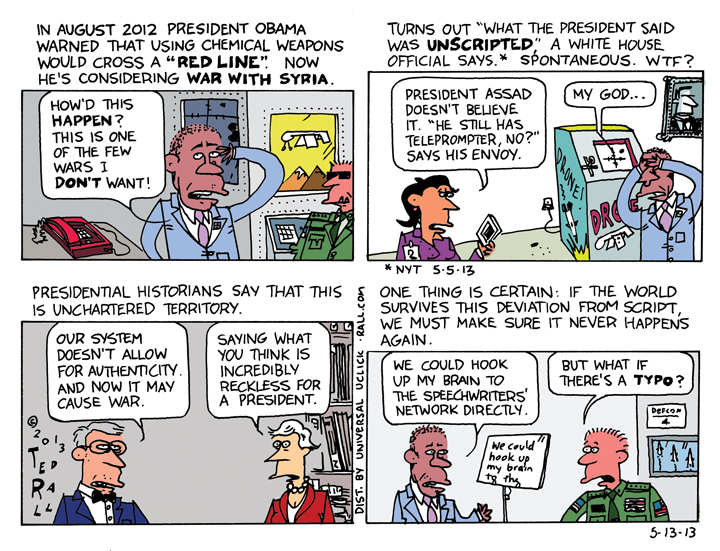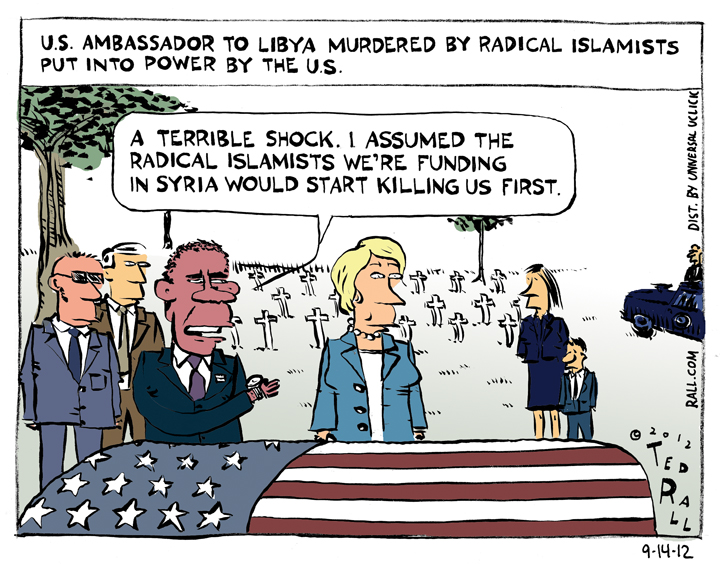
Think the President is Socialist? We Wish!
Memo to Republicans: you don’t have a monopoly on hating President Obama.
I dislike America’s two-party system for a lot of reasons. Mostly because the duopoly is undemocratic: no two political parties can represent the diversity of opinions held by a nation’s voters. We’d need dozens of parties to approximate adequate representative government. Another reason, one that deserves attention, is that it reduces political dialogue to binary imbecility.
Democrat or Republican. Liberal or conservative. If you’re not one, you must be the other. If you don’t vote, people — apparently rational, functional people who manage to drive their cars without ramming them into walls — tell you with a straight face that your non-vote is a de facto vote for the candidate you would have voted against (had you voted). Because you’re not allowed to hate both. Because, in under our idiotic one-or-the-other political system, even if you hate both parties, you’re supposed to hate one party more than the other.
Which is why, for the last four years, Obama-hating has belonged to the racist right.
In the real world, of course, lots of lefties can’t stand the president. In the mainstream corporate media narrative epitomized by MSNBC on the “left” and FoxNews on the “right,” however, left=liberal=Democrat and right=conservative=Republican. They say it so often and we hear it so much that many of us think it’s true.
In the real world, away from the barking dogs of cable television news, lots of Americans would vote for a party other than the Ds or the Rs. A 2012 poll found that 46% of Americans would support a third party if it were viable. Many on the right think the GOP is too extreme or too soft. That debate, the “civil war” between generic Republicans (e.g., Chris Christie) and the libertarian right (e.g., Rand Paul), gets some play.
Not so much on the left. Thanks largely to the left=Democrat propaganda of the late Air America and now MSNBC, lefties disgusted with the Democrats get zero play.
You’ll never find our views discussed or our champions interviewed, not even on the “liberal” shows hosted by Jon Stewart, Stephen Colbert or Bill Maher. But we exist. We are many. Even among self-identified Democrats, 14% of overall voters say they are “very liberal.” Unsurprisingly, this group disapproves of Obama’s job performance, which — contrary to right-wing talking points — has stayed away from policies friendly to his party’s traditional liberal base. Beyond that, about 10% of voters say they’re “disaffected” — so alienated from both parties that they refuse to participate in elections.
Greetings, right-wingers! We live in the same country. You should know about lefties who don’t like the Democrats — hold on to your seats — because they’re too conservative.
So, righties, you hate Obama because he’s a socialist. Or a liberal extremist. Because the Affordable Care Act goes too far. Because he was born in Kenya (and stole the presidency). Maybe (though you’re only allowed to say this among trusted friends) because he’s black.
Fine. I’m not going to try to change your minds.
Instead, I’m going to provide some perspective. To demonstrate that despite two centuries of puerile choose-one-outta-two electoral politics, America’s ideological landscape is broader and more diverse than you may be aware.
Tens of millions of Americans — progressives, paleoliberals, greens, populists, left libertarians, left anarchists and yes, socialists and communists — hate Obama for being too far to the right. Socialist? We wish! We think he’s a sellout. At best! More like a corporate shill. Definitely a militarist. Possibly a fascist.
Here is a brief summary of the left’s brief against Barack Obama:
He bailed out Wall Street, not Main Street. The banksters who wrecked the economy should have gone to prison; he gave them $7.77 trillion. Distressed homeowners got nothing. Nor did the unemployed. Lefties see Obama as a slave of Wall Street scum like Timothy Geitner and Lawrence Summers.
He didn’t lift a finger to create new jobs. Right-wingers blame regulations and ObamaCare. Not us. Leftists want big jobs programs, like the WPA during the Great Depression, to add tens of millions of un- and underemployed Americans directly to the federal payroll.
He’s a warmonger. He expanded and extended the wars against Afghanistan and Iraq. (And lied about ending them. He renamed “combat troops” to “support personnel,” and replaced soldiers with private “contractor” mercenaries. The U.S. will be fighting in Afghanistan and Iraq long after Obama “ended” those wars.) He got us into a new war in Libya. Now it’s Syria. In both cases we are supporting Islamist factions whose values we — not just lefties, but all Americans — do not share.
He refused to investigate the crimes of the Bush era: the lies the Administration used to con us into war in Iraq, torture, extraordinary rendition, spying on American citizens. We believe in accountability.
He expanded the drone wars. Many leftists are pacifists, opposing all war. Others accept the necessity of fighting to defend against an invasion. All agree that drone strikes, managed in secret, devoid of legal authorization and without checks or balances, are the worst kind of war: aggressive, impersonal, sanitized, mechanized, and especially enraging to its victims.
Most leftists are civil libertarians. We believe that personal freedoms are more important than the rights of the state. As we learned thanks to Edward Snowden, Obama has presided over a breathtaking expansion of the post-9/11 police state, violating the inherent right of every American to speak on the phone or write correspondence in private on a comprehensive, totalitarian scale.
Even ObamaCare, bête noire of the right, annoys us.
For us, the profit incentive has no place in something as existentially necessary as healthcare. We want big insurance companies out of the equation entirely. So, even though there are early indications that ObamaCare’s insurance marketplaces will lower premiums for many patients, we shrug our collective shoulders at such incrementalism. We wonder why socialized medicine — doctors and nurses employed directly by the state, hospitals nationalized — or at least a “single payer” option (which Obama promised during the campaign) was never seriously considered.
Then there’s Guantánamo, which he should have closed. Bradley Manning, tortured under his orders. Edward Snowden, who should have gotten a medal, hunted like a dog.
Any one of the above outrages deserves a long prison term.
If you’re a right-winger who hates Obama and the Democrats, remember us. We hate them just as much as you do — but not for the same reasons.
(Ted Rall’s website is tedrall.com. Go there to join the Ted Rall Subscription Service and receive all of Ted’s cartoons and columns by email.)
COPYRIGHT 2013 TED RALL




